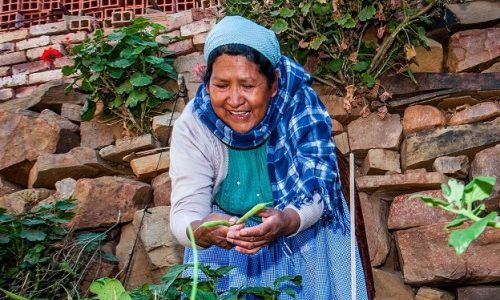
Poor migrant families live in the outskirts of the Bolivian city of Cochabamba. It is a dry area that has no drinking water or sewage system. Relatively expensive water is bought from the water carrier. The diet is one-sided consisting of potatoes with rice and sometimes some pasta. Vegetables are expensive in Bolivia. And it is frequently sprayed with chemical pesticides, even after harvest. The living environment is dusty and grey. Bare gardens near the house often serve as a storage place for broken things. Organic urban agriculture offers people the chance to improve the health of themselves, their families and their environment in various ways.
In 2021-2022, with a continuation of the organic urban farming project, Fundación Alerta Verda and the Wilde Ganzen Foundation wanted to teach as many families as possible how to start and maintain a vegetable garden independently, without using chemical crop protection agents and with the means at their disposal. The project focused primarily on family gardens, supplemented by gardens at schools and centres to enthuse children and their parents. Families that participated for a long time are eligible for aid with the installation of rainwater harvesting.
Small gardens have been established at families’ homes (and also at schools). Participants have received training on how to manage an organic vegetable garden, including composting and healthy cooking. Gardening tools, seeds and plants have been distributed. The residents grow mostly fast-growing vegetables, such as lettuce, chard and spinach. But also a variety of onion, tomato, courgette, parsley, celery and various other herbs. Nearby, apple trees and passion flowers have been planted. They give food and colour to the neighbourhood. In addition, gutters have been installed at the houses to better collect rainwater in water tanks and drip irrigation systems have been installed in the vegetable gardens.
Their own organic family vegetable gardens and school gardens enhance quality of life in many ways:
Active Health Foundation supported this project with a financial donation.
Would you like to help? Contribute in a way that suits you. Together, we make a healthy difference!